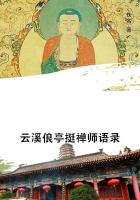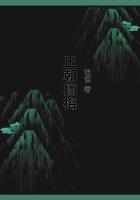His philosophy of love is but a special case of this all-embracing doctrine. We saw how in 'Epipsychidion' he rejected monogamic principles on the ground that true love is increased, not diminished, by division, and we can now understand why he calls this theory an "eternallaw." For, in this life of illusion, it is in passionate love that we most nearly attain to communion with the eternal reality. Hence the more of it the better. The more we divide and spread our love, the more nearly will the fragments of goodness and beauty that are in each of us find their true fruition. This doctrine may be inconvenient in practice, but it is far removed from vulgar sensualism, of which Shelley had not a trace. Hogg says that he was "pre-eminently a ladies' man," meaning that he had that childlike helplessness and sincerity which go straight to the hearts of women. To this youth, preaching sublime mysteries, and needing to be mothered into the bargain, they were as iron to the magnet. There was always an Eve in his Eden, and each was the "wonder of her kind"; but whoever she was--Harriet Grove, Harriet Westbrook, Elizabeth Hitchener, Cornelia Turner, Mary Godwin, Emilia Viviani, or Jane Williams--she was never a Don Juan's mistress; she was an incarnation of the soul of the world, a momentary mirror of the eternal. Such an attitude towards the least controllable of passions has several drawbacks: it involves a certain inhumanity, and it is only possible for long to one who remains ignorant of himself and cannot see that part of the force impelling him is blind attraction towards a pretty face. It also has the result that, if the lover is a poet, his love-songs will be sad. Obsessed by the idea of communion with some divine perfection, he must needs be often cast down, not only by finding that, Ixion-like, he has embraced a cloud (as Shelley said of himself and Emilia), but because, even when the object of his affection is worthy, complete communion is easier to desire than to attain. Thus Shelley's love-songs are just what might be expected. If he does strain to the moment of ingress into the divine being, it is to swoon with excess of bliss, as at the end of 'Epipsychidion', or as in the 'Indian Serenade':
"Oh lift me from the grass! I die! I faint! I fail!" More often he exhales pure melancholy:
"See the mountains kiss high heaven And the waves clasp one another; No sister-flower would be forgiven If it disdained its brother. And the sunlight clasps the earth, And the moonbeams kiss the sea: What is all this sweet work worth If thou kiss not me?"Here the failure is foreseen; he knows she will not kiss him.
Sometimes his sadness is faint and restrained:
"I fear thy kisses, gentle maiden, Thou needest not fear mine; My spirit is too deeply laden Ever to burthen thine."At other times it flows with the fulness of despair, as in"I can give not what men call love, But wilt thou accept not The worship the heart lifts above And the Heavens reject not, The desire of the moth for the star, Of the night for the morrow, The devotion to something afar From the sphere of our sorrow?"or in
"When the lamp is shattered The light in the dust lies dead-- When the cloud is scattered The rainbow's glory is shed. When the lute is broken, Sweet tones are remembered not; When the lips have spoken, Loved accents are soon forgot."The very rapture of the skylark opens, as he listens, the wound at his heart:
"We look before and after, And pine for what is not: Our sincerest laughter With some pain is fraught Our sweetest songs are those that tell of saddest thought."Is the assertion contained in this last line universally true? Perhaps. At any rate it is true of Shelley. His saddest songs are the sweetest, and the reason is that in them, rather than in those verses where he merely utters ecstatic delight, or calm pleasure, or bitter indignation, he conveys ineffable suggestions beyond what the bare words express.
It remains to point out that there is one means of conveying such suggestions which was outside the scope of his genius. One of the methods which poetry most often uses to suggest the ineffable is by the artful choice and arrangement of words. A word, simply by being cunningly placed and given a certain colour, can, in the hands of a good craftsman, open up indescribable vistas. But Keats, when, in reply to a letter of criticism, he wrote to him, "You might curb your magnanimity, and be more of an artist, and load every rift of your subject with ore," was giving him advice which, though admirable, it was impossible that he should follow. Shelley was not merely not a craftsman by nature, he was not the least interested in those matters which are covered by the clumsyname of "technique." It is characteristic of him that, while most great poets have been fertile coiners of new words, his only addition to the language is the ugly "idealism" in the sense of "ideal object." He seems to have strayed from the current vocabulary only in two other cases, both infelicitous--"glode" for "glided," and "blosmy" for "blossomy." He did not, like Keats, look on fine phrases with the eye of a lover. His taste was the conventional taste of the time. Thus he said of Byron's 'Cain', "It is apocalyptic, it is a revelation not before communicated to man"; and he thought Byron and Tom Moore better poets than himself. As regards art, he cheapened Michael Angelo, and the only things about which he was enthusiastic in Italy, except the fragments of antiquity which he loved for their associations, were the paintings of Raphael and Guido Reni. Nor do we find in him any of those new metrical effects, those sublime inventions in prosody, with which the great masters astonish us. Blank verse is a test of poets in this respect, and Shelley's blank verse is limp and characterless. Those triumphs, again, which consist in the beauty of complicated wholes, were never his. He is supreme, indeed, in ****** outbursts where there is no question of form, but in efforts of longer breath, where architecture is required, he too often sprawls and fumbles before the inspiration comes.
Yet his verse has merits which seem to make such criticisms vain. We may trace in it all kinds of 'arrieres pensees', philosophical and sociological, that an artist ought not to have, and we may even dislike its dominating conception of a vague spirit that pervades the universe; but we must admit that when he wrote it was as if seized and swept away by some "unseen power" that fell upon him unpremeditated. His emotions were of that fatal violence which distinguishes so many illustrious but unhappy souls from the mass of peaceable mankind. In the early part of last century a set of illustrations to Faust by Retzch used to be greatly admired; about one of them, a picture of Faust and Margaret in the arbour, Shelley says in a letter to a friend: "The artist makes one envy his happiness that he can sketch such things with calmness, which I only dared look upon once, and which made my brain swim round only to touch the leaf on the opposite side of which I knew that it was figured." So slight were the occasions that could affect him even to vertigo. When, from whatever cause, the frenzytook him, he would write hastily, leaving gaps, not caring about the sense. Afterwards he would work conscientiously over what he had written, but there was nothing left for him to do but to correct in cold blood, make plain the meaning, and reduce all to such order as he could. One result of this method was that his verse preserved an unparallelled rush and spontaneity, which is perhaps as great a quality as anything attained by the more bee-like toil of better artists.















